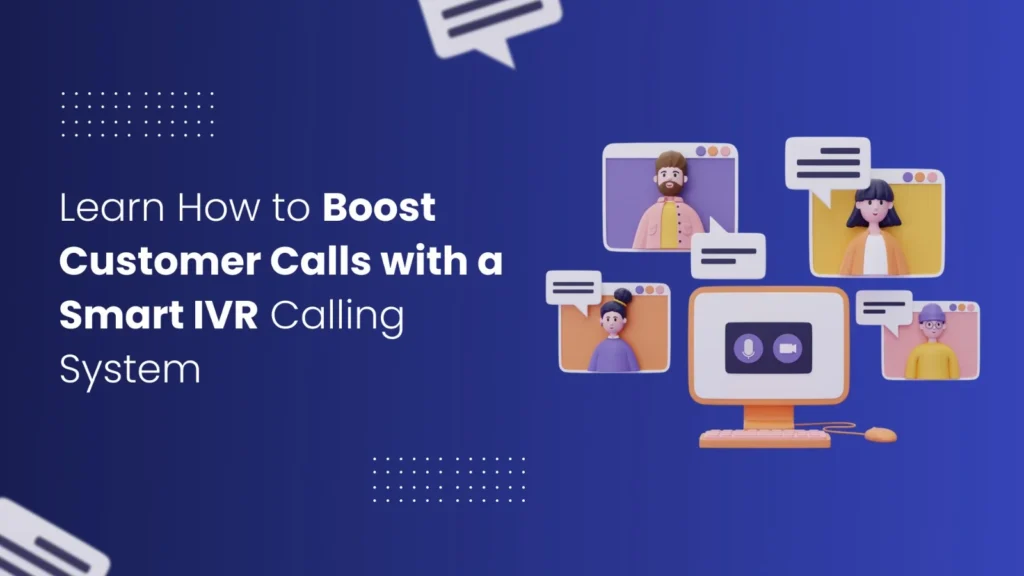In today’s digital-first world, one phone call can make or break a business deal. Customers expect fast answers, clear direction, and a professional experience when they call a business. But for many small and medium-sized businesses (SMBs), managing incoming calls efficiently is a real challenge—especially with limited staff or resources of smart IVR calling system.
So how can businesses handle large call volumes, reduce wait times, and still provide quality service? The answer lies in implementing a smart IVR calling system powered by cloud calling software. This guide will help you understand how it works, why it matters, and how to get started.
What Is an IVR Calling System?
An IVR calling system (Interactive Voice Response) is an automated phone solution that allows callers to interact with your business through pre-recorded voice menus using touch-tone keypad selections or voice input. It’s the system behind those familiar prompts like:
“Press 1 for Sales, Press 2 for Support.”
By using an IVR calling system, businesses can route calls to the right department, provide automated answers, and even collect caller information—all without requiring a live agent at every step.
Why Traditional Call Handling Falls Short
Many businesses still rely on manual call handling. This often leads to:
- Long hold times
- Calls getting misrouted
- Missed customer opportunities
- Frustrated callers and overwhelmed staff
As your business grows, so does the number of incoming calls. Without the right tools, you risk damaging your customer experience.
How an IVR Calling System Solves the Problem
With a smart IVR calling system, calls are automatically directed based on the caller’s input. This ensures:
- Callers reach the right person faster
- Your team isn’t interrupted with routine calls
- Customers can access basic info (like hours or order status) on their own
- Call logs are stored and organized automatically
When paired with cloud calling software, your communication becomes more flexible, centralized, and scalable—allowing your team to work from anywhere while maintaining service quality.
Before you go, this next article might answer your next question.
Why a Smart IVR Calling System Deserves Your Attention
A smart IVR calling system does more than route calls—it supports your team, improves customer service, and helps your business grow. Here’s why it matters:
- Automates Routine Tasks – Handles repetitive tasks like answering FAQs or collecting caller details—saving your agents time.
- Adapts to Your Business Needs – Easily customize voice menus and call flows to match your structure and services.
- Supports Personalization – Collect caller data to personalize the experience and improve satisfaction.
- Reduces Workload for Agents – Filters out simple queries so your team can focus on more complex issues.
- Ensures 24/7 Availability – Provides reliable service even outside business hours—no missed opportunities.
- Improves Efficiency and Professionalism – Keeps your call handling organized and smooth, even during busy periods.
- Scales with Your Business – Whether you’re a small startup or growing rapidly, a smart IVR calling system grows with you—without heavy resource use.
Key Benefits of an IVR Calling System
Let’s explore how implementing an IVR calling system can elevate your business operations.
1. Enhances Customer Experience – Callers are quickly guided to the right department or self-service option, reducing wait time and frustration.
2. Saves Team Resources – Automate repetitive inquiries (like FAQs, hours, or order status), freeing up your team for more complex issues.
3. Operates 24/7 – Your IVR calling system can serve customers after business hours, collect voicemails, or deliver key information anytime.
4. Reduces Errors – A structured call flow ensures customers are routed correctly—avoiding miscommunications or lost leads.
5. Boosts Analytics and Insights – Call data from the IVR system helps you track volume, duration, and trends—allowing smarter business decisions.
Use Cases Across Industries
Here’s how different businesses are benefiting from IVR and cloud calling software:
- Retail and E-commerce – Automate delivery status updates and return processing without live agent support.
- Clinics and Healthcare Providers – Book appointments, relay lab results, and handle routine queries automatically.
- Field Service Companies – Accept service requests, provide ETAs, and update customers—even while technicians are on-site.
- Call Centers – Route incoming calls efficiently while allowing remote agents to handle support using cloud calling software.
Must-Have Features in an IVR Calling System
To maximize the value of your IVR setup, look for features like:
- Custom voice menus
- Multi-language support
- Voicemail-to-email forwarding
- Real-time call logs and reports
- CRM and ticketing system integration
- Mobile and desktop compatibility via cloud calling software
These features make your system flexible, scalable, and customer-friendly.
How to Set Up an IVR Calling System
Getting started is simpler than you think. Here’s a step-by-step approach:
- Map Common Call Flows – Identify key call types—sales, support, billing—and define the ideal path for each.
- Select a Cloud Calling Provider – Choose a reliable provider that includes or supports IVR integration for seamless operations.
- Build Your IVR Menus – Keep options clear and minimal. Too many choices confuse callers.
- Test the System Thoroughly- Simulate real customer calls and adjust for tone, clarity, and accuracy.
- Train Your Team – Ensure everyone understands the system and knows how to handle routed calls.
- Monitor and Improve – Use analytics to refine your IVR paths, update messages, and adapt to evolving customer needs.
Mistakes to Avoid
- Overcomplicating the Menu: Keep call flows simple and easy to follow.
- Forgetting the Human Option: Always offer an option to connect with a real agent.
- Neglecting Updates: Keep business hours, promotions, and greetings current.
- Ignoring Data: Review IVR and call performance reports regularly to identify gaps.
Final Thoughts: Smarter Calls Start Here
Investing in a smart IVR calling system is no longer optional—it’s essential. It allows businesses to manage growing customer expectations without growing overhead. Paired with cloud calling software, your phone system becomes a strategic asset that improves efficiency, professionalism, and accessibility.
Whether you’re a startup, local business, or scaling enterprise, the right system helps you make every call count.
Now is the time to modernize your call strategy. Explore IVR and cloud-based tools that support your business goals—and build stronger customer relationships, one call at a time.
Want more insights like this? Head over to Management Works Media and start exploring.






